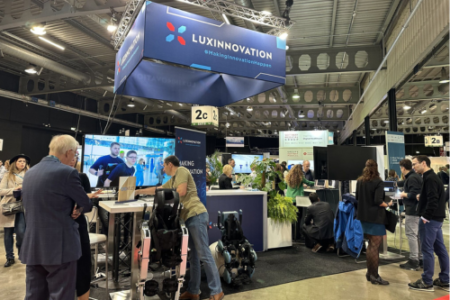Healthcare systems across the world are currently under pressure, having to deal with an aging population, an increased disease burden, exorbitant costs and a lack of qualified staff. At the same time, healthcare innovation abounds, and new health technologies are developing at breathtaking speed. But how do we make sure that new solutions are adopted in a way that really benefit patients? This question was a central point of discussion at the 2024 Luxembourg Healthcare Week, organised on 1-2 October by the Federation of Luxembourg Hospitals (FHL).
Our objective should be to improve the health of the entire population.
“Our objective should be to improve the health of the entire population, put the patient in the centre and make sure that we are able to face major challenges such as the recent COVID pandemic,” said Martine Deprez, Minister of Health and Social Security, in her opening address. “We need more integrated systems that focus on the patient.”
Fundamental shift required
However, achieving this requires new ways of thinking. “What do we want, the best healthcare system, or the healthiest population?” asked keynote speaker Bogi Eliasen, Director of Health at the Copenhagen Institute for Futures Studies. He argued that our current hospital structures, put in place to deal with emergencies, no longer fit a society where 85% of the health burden is made up of chronic diseases. “We need to make a fundamental shift from sick care to preventive health and emphasise the early detection and treatment of diseases.”
30% of the chronic disease burden is avoidable if we deploy technology at the right time in the right way.
Technology has a key role to play but needs to be used in the right way. Mr Eliasen pointed out that while the healthcare system has never had more funding, tools, data and knowledge than now, problems persist. “30% of the chronic disease burden is avoidable if we deploy technology at the right time in the right way, but we are still poor at precise diagnostics.”
Supporting collaborative innovation
A recurrent topic emphasised throughout the Luxembourg Healthcare Week was the need for different stakeholders – health professionals, patients, innovators and health authorities, among others – to work together to overcome these issues. Lex Delles, Minister of the Economy, SMEs, Energy and Tourism, emphasised several collaborative initiatives put in place in Luxembourg:
- the multi-partner project aimed at developing the country’s first dataspace for health;
- the joint healthtech calls funding collaborative projects involving companies, research centres and hospitals which aim to demonstrate the security and performance of innovative, digital health technologies; and
- the Health and Life Sciences Innovation (HE:AL) Campus under construction that will host entrepreneurs, researchers and clinicians under the same roof.
 “The medical field also has an economic value and is a field where companies are created and innovation is done,” Minister Delles pointed out. “Luxembourg hosts a range of startups that are innovative, ask questions and push the boundaries of healthtech.”
“The medical field also has an economic value and is a field where companies are created and innovation is done,” Minister Delles pointed out. “Luxembourg hosts a range of startups that are innovative, ask questions and push the boundaries of healthtech.”
Luxinnovation’s booth at the event hosted several startups and more mature healthtech companies that had the opportunity to present their products and solutions to potential partners. The exhibiting companies notably included MDsim, winner of the Luxembourg Healthcare Week’s startup award supported by Luxinnovation.
AI and data: the big question
The use of artificial intelligence (AI) in healthcare was a much-discussed topic during the event. Dr Giovanni Briganti, Chair of AI & Digital Medicine at the University of Mons, presented the outcomes of a national study conducted in Belgium on the adoption of AI in the healthcare field. “We found that Belgian clinicians are very positive to AI and want to use it to increase the speed and reliability of decision making, free up more time for value-added tasks and reduce the risks for errors,” he said.
While AI promises a huge potential for improving healthcare, there are still many challenges to solve – technical ones, but not only. “We need to think hard in advance about what to do with the time that AI solutions can free up,” Dr Briganti emphasised. “If this is not planned in advance, there is a risk that the time will be used even worse than in the past.”
This data could benefit innovators and, in the next stage, patients, but creating the bridges between the players involved can sometimes be complex.
The use of AI and data is a recurrent theme in the support that Luxinnovation provides to healthtech companies. “It is very important that the companies we work with understand the implications of the European Health Data Space, which sets out a common EU framework for the use of health data, so that they can make sure that their data use adheres to the legal and regulatory requirements,” says Jean-Philippe Arié, Luxembourg HealthTech Cluster Manager at Luxinnovation.
A second key issue is finding ways to ensure that healthtech innovators can get access to the health data needed for them to develop and refine their solutions. “Hospitals and big private players, such as software providers, are sitting on huge amounts of data and, according to Mr Eliasen, only 3% are currently used. This data could benefit innovators and, in the next stage, patients, but creating the bridges between the players involved can sometimes be complex,” Dr Arié points out. “How to find the right solutions will be the main topic of the 2025 European Digital HealthTech Conference that Luxinnovation will host on 25-26 March next year. I encourage everyone interested in this topic to pre-register already in order to be part of the discussion.”


